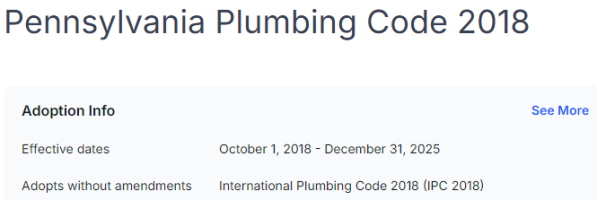2021 Pennsylvania Plumbing Code
[A] 102.9 Requirements Not Covered by Code
Any requirements necessary for the strength, stability or proper operation of an existing or proposed
plumbing system, or for the public safety, health and general welfare, not specifically covered by this code shall be determined by the
code official.
301.4 Connections to Water Supply
Every
plumbing fixture, device or appliance requiring or using water for its proper operation shall be directly or indirectly connected to the
water supply system in accordance with the provisions of this code.
PPC 202 Definitions
Water supply system. The flow of water or other liquids, mixtures or substances into the distribution pipes of a
potable water supply from any source except the intended source.
POTABLE WATER. Water free from impurities present in amounts sufficient to cause disease or harmful physiological effects and conforming to the bacteriological and chemical quality requirements of the Public Health Service Drinking Water Standards or the regulations of the public health authority having jurisdiction.
602.2 Potable Water Required
Only
potable water shall be supplied to
plumbing fixtures that provide water for drinking, bathing or culinary purposes, or for the processing of food, medical or pharmaceutical products. Unless otherwise provided in this code,
potable water shall be supplied to all
plumbing fixtures.
602.3 Individual Water Supply
Where a potable public water supply is not available, individual sources of
potable water supply shall be utilized.
602.3.1 Sources
Dependent on geological and soil conditions and the amount of rainfall,
individual water supplies are of the following types:
drilled well,
driven well, dug
well,
boredwell, spring, stream or
cistern. Surface bodies of water and land
cisterns shall not be sources of
individual water supply unless properly treated by
approved means to prevent
contamination.
Individual water supplies shall be constructed and installed in accordance with the applicable state and local laws. Where such laws do not address all of the requirements set forth in NGWA-01,
individual water supplies shall comply with NGWA-01 for those requirements not addressed by state and local laws.

